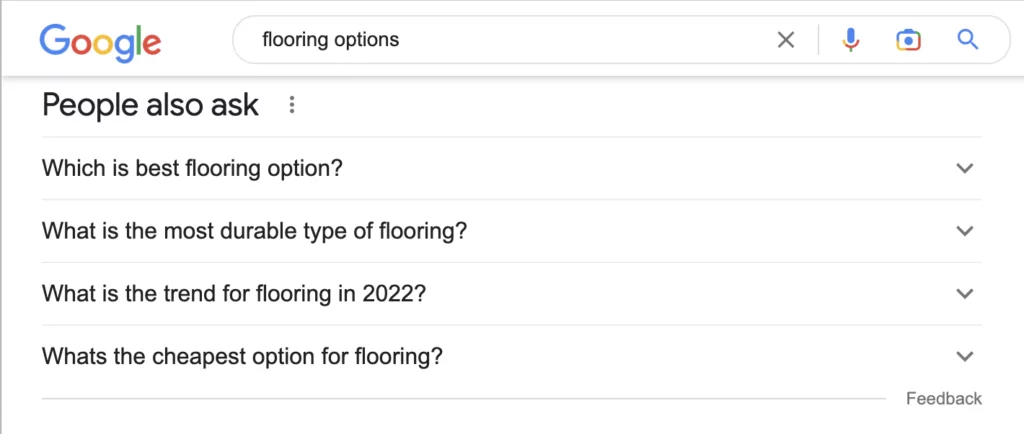Frequently asked question pages often end up far down the priority list of websites. However, these pages are crucial to your website and business’s success. Therefore, the website FAQ page deserves the same attention as the homepage and other landing pages.
Learn the vital role website FAQs play in bringing in new customers and addressing customer concerns.
Key Takeaways:
- A website FAQ page addresses key customer concerns to improve the chances of converting website traffic.
- Use first-party data from customers and online research to identify common questions to address on the page.
- An FAQ page improves customer experience and frees customer service to focus on more in-depth queries.
What Goes on a Website FAQ Page?
A website FAQ page holds vital questions customers ask about a business and its products. Companies should regularly keep this page updated so customers can quickly consult it for the latest information about the business.
There are many ways to create an FAQ for a website. If a page has a handful of questions, the website designers usually place the FAQs in a list format. However, when there are more questions, creators become more creative. For instance, the page might list the questions at the top of the page so customers can quickly jump to the answers they need. Designers also add search bars to help customers find answers more conveniently.
In addition to questions, a FAQ page also has a call to action. Often customers come to the FAQ page because they still have concerns about a product or business. The FAQ page can address those concerns and provide an easy way for customers to complete the purchase process through a call-to-action link that might take them to the pricing page or another key website conversion page.
Where to Find Relevant FAQs for the Website
How do businesses decide what questions to add to the FAQ on a website? Here are a few common places to look:
- Google Search: Look at the “People also ask” section of Google searches for industry topics to find common questions customers are searching for.
- Keyword Research: Use keyword research tools like Semrush to identify long-tail keywords in question formats.
- Actual Customer Questions: Save questions that customers submit to customer service or support and address those questions on an FAQ page.
- Forums: Look on public forums like Reddit or Quora for questions in your industry that customers are discussing.
Source: Google
5 Ways to Use a Website FAQ Page
Use your FAQ page to accomplish these five results:
1. Rank for Common Search Questions
FAQ pages for SEO help websites rank for more industry-related topics. For example, when businesses pull questions from Google or keyword research tools, the company improves its chances of ranking for those terms.
Because question phrases are longer and more specific than traditional keywords, they often are easier for businesses to rank for because those keywords are far less competitive.
Source: Ahrefs
In this way, businesses can attract customers who are undecided about the company or product. For example, a customer might see an ad for your products but still have concerns. So, that customer turns to Google Search to do more research. Ranking for common questions helps businesses build trust with those customers.
2. Reduce Your Customer Service’s Workload
When customers have concerns, customer service is one of the primary places they turn to for answers. However, customer service can quickly become overwhelmed by a large call volume. In addition, customers become frustrated because of long wait times just to ask a small question.
Adding a FAQ page can reduce the customer service call volume. In addition to customer service, businesses can provide resources for customers to find their own answers. This allows customer service to focus on more complex issues while customers with quick questions can find immediate solutions on the FAQ page.
A notable 82% of customers consult knowledge bases like FAQ pages compared to the 81% that consult chat and live support. By splitting the workload between customer service and FAQ pages, businesses can improve the customer experience by reducing the time customers have to wait for responses to their inquiries.
3. Nurture More Leads
Just over 94% of website visitors don’t convert. Some reasons customers don’t purchase when visiting a website include:
- Lack of trust
- Lack of information about the product
- Don’t feel the need
- Don’t understand the value of the products
The frequently asked questions page addresses those concerns and ensures businesses remove common roadblocks to purchasing. This nurtures leads who are on the fence about buying products. Lead nurturing shortens the sales cycle and boosts a business’s conversion rate.
4. Extend Website Content
FAQ pages don’t replace website content. Instead, FAQs add to current content marketing strategies. For instance, FAQs summarize essential product and business information on one convenient resource page.
Conversely, website content expands on questions on the FAQ page. For example, each frequently asked question might link to an entire blog post that digs deeper into the question. While the short answer provides an easy response for customers, the longer blog post builds trust with customers performing deep research before committing.
5. Track Page Interactions
Website FAQ pages are a valuable source of data to improve marketing efforts. Marketers can track the performance of the page and customer interactions to see what questions customers are most interested in. Then, marketers can build additional content around those questions, like addressing them in a webinar or answering a question in a newsletter.
The page’s data also tells the business how relevant the FAQs are. So, for example, if companies notice many customers land on the page but bounce quickly, the business knows the FAQ page needs more relevant information.
However, if the page performs well and brings in a large amount of traffic, the business can keep the page updated to maintain that high performance.
Boost Your Customer Experience Through FAQ Pages
You can improve your customer experience with a frequently asked question page. MXTR helps you track the customer journey and identify key concerns that cause customers to hesitate about purchasing products. Use the data from our lead management platform to reduce the number of leads you lose by building an FAQ page based on real customer questions and concerns.
Schedule a demo to see how the platform can boost your company’s sales.
Featured Image: istockphoto









